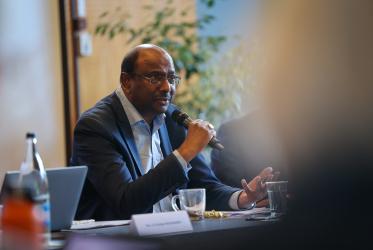Dr Mwai Makoka, World Council of Churches programme executive for Health and Healing, warned that “the crisis could not be wasted,” while noting that the current health structures were skewed toward delivery of curative services. He cautioned that investing all energies in curative services was not prudent.
“…one good thing can we develop as a way of not wasting the pandemic (lessons)…(and) as a way of building back better is to shift away from predominantly curative health services,” Makoka, a Malawian medical doctor, said during the webinar, titled “COVID-19 Pandemic: Faith and Science in Conversation” on 23 March.
The webinar was part of an online conference organized by the Ecumenical Pharmaceutical Network in collaboration with the All Africa Conference of Churches and Africa Christian Health Association Platform.
Church leaders, faith leaders, representatives from Christian health associations and drug supply organizations participating in the webinar took stock of how the faith sector and health systems in Africa have addressed COVID-19 vaccine uptake. Participants also issued a joint declaration on vaccine uptake in Africa.
Makoka said the churches, church health institutions and faith-based organizations should not just think of clinics and pharmacies. He explained that the delivery of healthcare and availability of big hospitals and ample supply of drugs and vaccines in cold rooms was programmatically a long distance.
“When we talk about churches doing health, what comes to mind should not be hospitals, but what local congregations can do to promote healthcare,” said Makoka.
The churches may not be able to build expensive hospitals, according to Makoka, because the institutions are expensive to construct, run, staff and keep health workers salaried.
“We can do health messaging, we can do capacity strengthening, we can work on promoting linkages between care and local communities. We can work on community understanding of health challenges and work with the community to find answers to health challenges,” he said.
Speakers observed that Africa continues to lag behind in COVID-19 vaccine uptake, with only six million people being vaccinated every week out of a population of nearly a billion. In presentations, they also stressed that access to COVID-19 vaccines was a basic human right in this pandemic situation.
According to Christina Haefele-Abah, chairperson of Ecumenical Pharmaceutical Network board, many obstacles in the sector can be overcome through the combined effort of all stakeholders, including the faith-based community.
“Church leaders and the faith-based sector have to take over responsibility and use their means and influence to get involved and advocate for a positive change,” said Haefele–Abah.
Rev. Dr Fidon Mwombeki, general secretary of the All Africa Conference of Churches, said the slow uptake of the COVID-19 vaccine required African people, their countries and global partners to reset programmes and ideologies.
“We as faith leaders and scientific professionals need to discuss with our governments how we can influence people to take up COVID-19 vaccination, so that the uptake and the reach could be more,” said Mwombeki, a Lutheran pastor from Tanzania.








